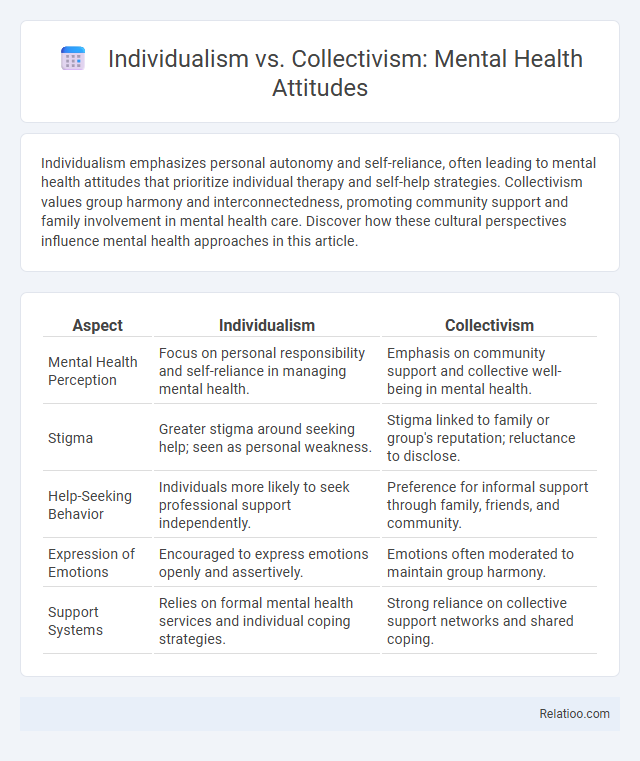Individualism emphasizes personal autonomy and self-reliance, often leading to mental health attitudes that prioritize individual therapy and self-help strategies. Collectivism values group harmony and interconnectedness, promoting community support and family involvement in mental health care. Discover how these cultural perspectives influence mental health approaches in this article.
Table of Comparison
| Aspect | Individualism | Collectivism |
|---|---|---|
| Mental Health Perception | Focus on personal responsibility and self-reliance in managing mental health. | Emphasis on community support and collective well-being in mental health. |
| Stigma | Greater stigma around seeking help; seen as personal weakness. | Stigma linked to family or group's reputation; reluctance to disclose. |
| Help-Seeking Behavior | Individuals more likely to seek professional support independently. | Preference for informal support through family, friends, and community. |
| Expression of Emotions | Encouraged to express emotions openly and assertively. | Emotions often moderated to maintain group harmony. |
| Support Systems | Relies on formal mental health services and individual coping strategies. | Strong reliance on collective support networks and shared coping. |
Understanding Individualism and Collectivism
Understanding individualism emphasizes personal autonomy and self-expression, fostering mental health attitudes that encourage seeking help and prioritizing personal well-being. Collectivism values group harmony and social interdependence, often leading to mental health stigma due to fears of burdening others or disrupting social cohesion. Your awareness of these cultural frameworks can help navigate and reduce stigma by aligning mental health support with culturally relevant values.
Core Differences in Cultural Mental Health Attitudes
Individualism emphasizes personal autonomy and self-reliance, leading to a preference for private coping with mental health issues, often resulting in higher stigma due to fears of personal weakness or failure. Collectivism prioritizes group harmony and interdependence, encouraging seeking social support but sometimes intensifying stigma through concerns about family reputation and social shame. These core cultural differences shape mental health attitudes, influencing help-seeking behaviors and the perception of mental illness across diverse societies.
The Impact of Individualism on Mental Health Perceptions
Individualism emphasizes personal autonomy and self-reliance, often leading to increased mental health stigma as individuals may perceive seeking help as a sign of weakness or failure. This cultural orientation can result in underreporting of mental health issues and reluctance to access support services. Research indicates that societies valuing individualism experience higher rates of mental health-related shame, which negatively impacts treatment engagement and recovery outcomes.
Collectivist Values and Community Mental Wellness
Collectivist values emphasize interdependence and social harmony, shaping mental health attitudes by prioritizing community support over individual expression. In collectivist societies, mental health stigma often arises from concerns about family reputation and social cohesion, leading to underreporting and reluctance to seek help. Promoting community mental wellness in these contexts involves culturally sensitive interventions that engage family networks and reduce stigma through collective education and shared coping strategies.
Stigmatization of Mental Illness: East vs West
Collectivist societies in the East often emphasize social harmony and interdependence, which can lead to greater stigmatization of mental illness due to fears of bringing shame to the family or community. In contrast, individualistic Western cultures prioritize personal autonomy and self-expression, promoting more open discussions about mental health but still facing significant stigma related to perceived weakness or unpredictability. Research shows that these cultural differences shape mental health attitudes, impacting help-seeking behaviors and access to treatment across regions.
Family Roles in Support and Recovery
Family roles significantly influence mental health attitudes within individualistic and collectivist cultures, shaping support and recovery processes. In collectivist societies, family members often play a central role in providing emotional support and encouraging treatment adherence, reducing mental health stigma through shared responsibility. Conversely, individualistic cultures emphasize personal autonomy, which can lead to less family involvement but greater emphasis on self-directed recovery, potentially increasing stigma due to perceived weakness in seeking help.
Accessibility of Mental Health Resources
Individualism often emphasizes personal responsibility, which can lead to underutilization of mental health resources due to stigma and fear of self-reliance failure, whereas collectivism fosters community support, improving accessibility and acceptance of mental health services. Studies reveal that collectivist societies exhibit lower mental health stigma, facilitating shared resource use and collaborative coping strategies. Accessibility to mental health care significantly improves when cultural values align with communal support systems, reducing barriers to seeking help.
Coping Mechanisms in Individualist and Collectivist Societies
Coping mechanisms in individualist societies often emphasize personal autonomy and self-reliance, encouraging individuals to seek professional mental health support and openly discuss emotional struggles without shame. In contrast, collectivist societies prioritize group harmony and social support, where coping may involve relying on family and community networks but also facing greater mental health stigma that can inhibit seeking formal treatment. Understanding these cultural differences in mental health attitudes helps you navigate and address coping strategies effectively within diverse cultural contexts.
Implications for Therapy and Counseling Approaches
Individualism emphasizes personal autonomy and self-expression, shaping mental health attitudes that prioritize individual coping strategies and self-help in therapy. Collectivism fosters interconnectedness and social harmony, leading to preferences for family involvement and community-based support in counseling approaches. Understanding these cultural dimensions is essential for therapists to reduce mental health stigma and tailor interventions that resonate with clients' values and social contexts.
Bridging the Cultural Gap: Towards Inclusive Mental Health Care
Bridging the cultural gap in mental health care requires addressing the contrast between individualism and collectivism, where individualistic societies emphasize personal autonomy while collectivist cultures prioritize group harmony. Mental health stigma varies significantly, with collectivist communities often associating mental illness with social shame, hindering help-seeking behaviors and treatment adherence. Inclusive mental health care must integrate culturally sensitive approaches that respect these differing attitudes, reduce stigma, and promote accessible, respectful interventions tailored to diverse cultural contexts.

Infographic: Individualism vs Collectivism mental health attitudes
 relatioo.com
relatioo.com